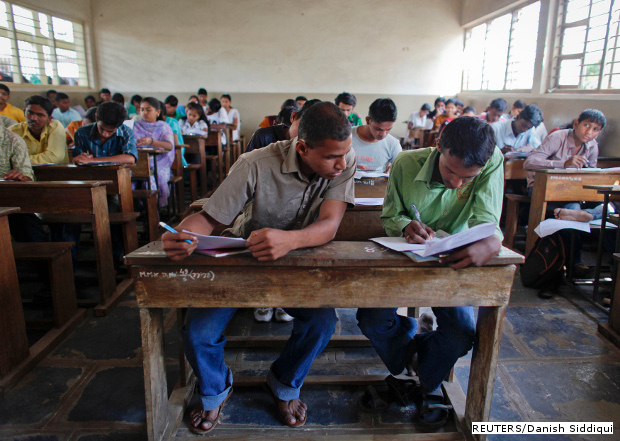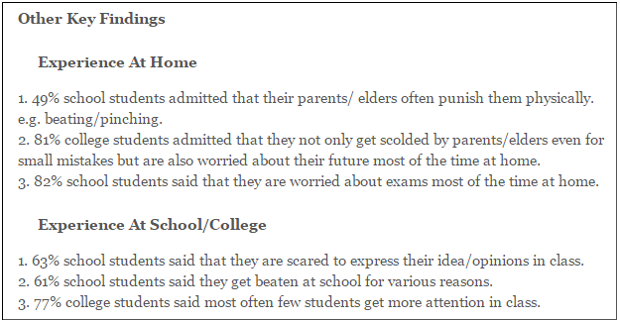44% College Students: Women Must Accept Violence

India is a political democracy, but India's society is not democratic. That has been a hypothesis offered by many social scientists.
Now there is empirical proof--from India's hope for the future, its school and college students:
* 65% school children “don’t know” that they are citizens of India
* 65% of college students disapprove of boys and girls from different religions meeting in public places
* 44% of college students “agree” that women have no choice but to accept a certain degree of violence
* 51% college students believe women must mainly take care of the household and bring up children.
Regressive attitudes abound. A majority of college students favour military rule, almost half believe domestic workers do not have the right to a minimum wage, and more than a third of female college students and more than a fourth of male students believe giving and taking dowry is acceptable.
These are some of the key findings of one of the largest-ever nationwide surveys on youth attitudes, conducted by Children’s Movement for Civic Awareness (CMCA), a Bengaluru-based non-government organisation that works to nurture democratic values among young Indians.
“One of the most disturbing finding of this survey has been the negative and undesirable attitude of young people towards gender, diversity and social issues,” Dr. Manjunath Sadashiva, director, CMCA told IndiaSpend.
The only issue on which students do not appear to have regressive attitudes is the environment. More than 70% believe it is important to collect rainwater and protect lakes.
Called Yuva Nagarika Meter (Youth Citizenship Meter), the study was conducted in association with the Indian Market Research Bureau (IMRB). The field research was spread across 11 states and covered 10,542 students: 6,168 students from 9th standard and 4,374 college students from first year undergraduate courses.
The study, one of the largest ever, revealed that youth in non-metro cities (Guwahati, Lucknow, Patna, Jaipur and Bhopal) appeared more progressive than metro cities (Bangalore, Delhi, Mumbai, Chennai, Kolkata and Ahmedabad).
Let us look at specific attitudes.
| Parameters | High School Score (%) | College Score (%) |
| Score on Knowledge and Comprehension of Rights and Responsibility | 27 | 31 |
| Correctly understanding the meaning of Fundamental Right to Protection Against Exploitation | 24 | 29 |
| Correctly understanding the meaning of Fundamental Right to Equality | 35 | 39 |
| Consider themselves "Citizens" of India | 35 | NA |
Source: Yuva Nagarika Meter; NA means question not asked; Figures in %
The score for high school students with regards to rights and responsibility was only 27%,while it was only a tad better at 31% for college students.
Only 35% of school students consider themselves citizens of India.
Only 24% of high-school students and 29% of college students “correctly” understand the meaning of right against exploitation.
| Parameters | High School Score (%) | College Score (%) |
| Score on Knowledge and Comprehension of Democratic Governance | 17 | 19 |
| Score on Attitude towards Democratic Governance | NA (Questions were not included for school students) | -11% |
| Do not know that legislature is responsible for enacting laws | 74 | 75 |
| "Agreed" that India should have only one strong political party at the centre to rule the entire country | NA | 67 |
| Have fuller understanding of democracy that it is all about the rule of law, equality, human rights, and elections | 37 | 38 |
| Military should rule India for some years | NA | 53 |
Source: Yuva Nagarika Meter; NA means question not asked; Figures in %
The low score of 19% among college students on democratic governance indicates the weakness in imparting civic knowledge and lack of exposure at higher level of education.
A very large number of college students support dictatorial or authoritarian form of government, which is represented by minus 11% score on attitude towards democratic governance.
More than half (53%) of college students favour military rule in India for "some years".Faith in democratic governance is fading. The reasons: Corruption, scams, lack of policy implementation and poor governance.
Civic Rules
| Parameters | High School Score (%) | College Score (%) |
| Score on Attitudes towards Adherence to Civic Rules | 15 | 10 |
| "Agreed" that it is all right to violate rules because the penalty is small | 37 | 40 |
| "Agreed" that it is all right to violate rules because one can get away by bribing the officials | 42 | 44 |
| "Agreed" that it is difficult to follow rules when others are violating the same | 49 | 54 |
Source: Yuva Nagarika Meter; Figures in %
Once again, a low score of 15% and 10% highlights disdain students have for civic rules and laws. This is reflected in the widespread violation of laws by citizens and government officials by means of bribes, breaking traffic rules and not paying taxes.
Environment
| Parameters | High School Score (%) | College Score (%) |
| Score on Attitudes Practices related to Environmental Conservation | 40 | 45 |
| Feel it is important that everyone must collect and use rain water | 70 | 75 |
| Feel it is important people reduce the wastage of water | 79 | 83 |
| Feel it is important that people and government must protect lakes and tanks | 77 | 78 |
Source: Yuva Nagarika Meter; Figures in %
Environmental conservation is the highest-scoring domain. This can be attributed to large-scale awareness programmes and campaigns on global warming and climate change in schools and colleges by NGOs.
Academic inclusion of environmental science as a subject could be credited for positive attitudes.
Gender
| Parameters | High School Girls | High School Boys | College Girls | College Boys |
| Score on Attitude towards Gender Equality | 15 | 8 | 13 | 6 |
| Agree that women have no choice but to accept a certain degree of violence | 37 | 42 | 43 | 44 |
| Agree that women dress and behave in certain ways to provoke violent reactions from men | 51 | 55 | 55 | 59 |
| Admitted that dowry is a practice in their community and felt that they should accept this practice | NA | NA | 36 | 44 |
Source: Yuva Nagarika Meter; NA means question not asked; Figures in %
| Parameters | High School & College combined Score (%) |
| Agreed that women can perform equally well or better than men in all professions | 71 |
| Agreed that the main role of women is to take care of the household and bring up their children | 51 |
Source: Yuva Nagarika Meter
More than half of college and school students (51%) believe the main role of women is to take care of the household and bring up their children.
Giving and taking dowry is to be acceptable to 36% girls and 44% college-going boys. IndiaSpend had earlier reported that 22 married women die every day in the country due to dowry-related disputes.
Diversity and Social Justice
| Parameters | College Students |
| Score on Attitude towards Diversity and Social Justice | 23 |
| Expressed intolerance regarding migrant workers from other states | 50 |
| Agreed that people who work as construction workers cannot have the right to demand proper housing and toilets at the construction site | 45 |
| Agreed that people who work as domestic workers for household help cannot have the right demand minimum wages and other facilities | 49 |
| Favoured prohibition of meeting between boys and girls belonging to different religions in public places | 65 |
Source: Yuva Nagarika Meter; Figures in %
Among college students, 65% do not want boys and girls belonging to different religions to meet in public places. IndiaSpend has reported on India's communal and caste divide: 72,126 riots were reported in 2013.
Among college and school students, 49% agreed that household domestic workers do not have the right to demand minimum wages and other facilities.
If equality does not appear to be valued, that could be because democracy itself appears to be a fuzzy notion.
“Young people lack the understanding of the true meaning and value of democracy. What is most disturbing is the education system that we have today is not really equipping young people with critical thinking skills which are crucial for democracy," Dr. Manjunath said. "They are being prepared to become economic or market actors rather than critical thinkers.”
An important lesson that comes out from the study, according to Dr. Manjunath, is that unless we transform the institutions we will not be able see the change.
“As a country, we are a political democracy but as a society we are not," said Dr Manjunath. "There is a huge gap. Therefore, one of the primary objectives of this research was to impress policy makers with the need to reform citizenship education.”

Source: Yuva Nagarika Meter
Note: This copy has been updated to reflect the correct percentage of college students who believe a woman must accept violence.
_____________________________________________________________________________
“Liked this story? Indiaspend.org is a non-profit, and we depend on readers like you to drive our public-interest journalism efforts. Donate Rs 500; Rs 1,000, Rs 2,000.”


